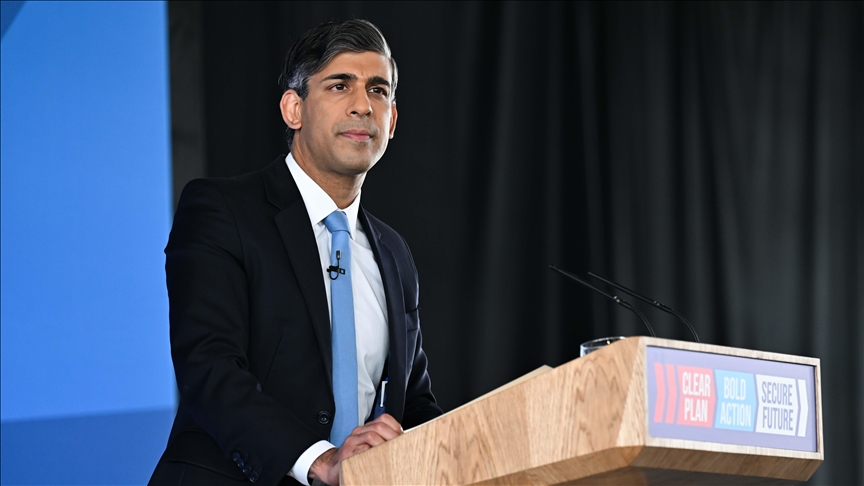
British Prime Minister Rishi Sunak faced rigorous questions from the audience Thursday in a high-stakes BBC Question Time Leaders’ Special held in York.
The session, moderated by journalist Fiona Bruce, featured half-hour segments for each leader, beginning with Ed Davey of the Liberal Democrats followed by John Swinney of the Scottish National Party, Keir Starmer of the Labour Party and concluding with Sunak.
– Sunak defends leadership amid party turmoil
Sunak was immediately confronted with questions about the frequent changes in the Conservative Party’s leadership.
He acknowledged the turbulence and admitted that “mistakes had been made” when he first took office.
Sunak asked to be judged on his 18 months in office, emphasizing his commitment to restoring economic stability and continuing tax cuts.
Addressing the sensitive issue of migration, he expressed pride in his immigrant heritage, noting his grandparents’ humble beginnings and his rise to prime minister.
However, he said that the current level of migration is too high and proposed a legal migration cap should the Conservatives win the next election.
He insisted that families of migrants must be financially self-sufficient, highlighting that many are willing to come without dependents.
Sunak also touted his economic achievements, pointing to a significant drop in inflation from 11% to 2% during his tenure.
Responding to a question about the impact of Brexit on young people, he reaffirmed the decision made in the 2016 referendum and cited the Teesside Freeport as an example of Brexit’s potential to attract investment and create jobs.
– Starmer, Swinney and Davey under the spotlight
Labour leader Keir Starmer addressed issues such as housing costs and his plans for the National Health Service (NHS).
He was also challenged on his previous support for then-Labour party leader Jeremy Corbyn’s 2019 election manifesto. Starmer emphasized the need for affordable housing and better health care services, outlining his vision for the future under a Labour government.
Starmer once again avoided giving a direct response to whether he genuinely believed that Corbyn would make a great prime minister during the 2019 general election.
When questioned about his past endorsements of Corbyn, Starmer repeatedly deflected, emphasizing his focus on campaigning for the Labour Party rather than individual opinions.
Pressed further on whether he thought Corbyn would have been a good prime minister, Starmer shifted the focus to the shortcomings of Boris Johnson’s tenure.
“Look what we got — Boris Johnson, a man who made massive promises, did not keep them, and then had to leave parliament in disgrace,” he said.
Additionally, Starmer addressed a question on immigration targets, firmly stating his opposition to setting unrealistic goals.
“Every single politician who has put a number on it has never met that number,” he said, advocating for a balanced approach to immigration that benefits the economy and the country.
He emphasized the need to significantly reduce immigration numbers while understanding the underlying issues.
Defending his position on recent policy reversals, Starmer justified U-turns on tuition fees and nationalizing energy companies by citing the post-COVID fiscal landscape.
He argued that prioritizing NHS funding over abolishing tuition fees was a necessary adjustment and that nationalizing energy companies would not have provided immediate relief for rising bills.
SNP leader John Swinney faced tough questions on Scottish independence and recent scandals within his party.
He admitted that it has been a “turbulent time” for the SNP but reaffirmed his commitment to independence, arguing that it remains the best path forward for Scotland.
Ed Davey, leader of the Liberal Democrats, was scrutinized over the party’s spending plans and past issues of trust, particularly the “broken promise” on tuition fees during their coalition government tenure.
Davey aimed to rebuild trust by presenting a fiscally responsible plan and addressing the needs of the public.
